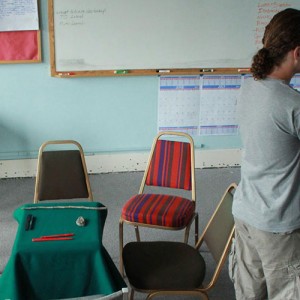Evan, Willem, and new WAYK game leader Peter, sit down to talk about how the recent Chinuk Wawa conversation night went. This kind of “debrief” conversation plays a critical role in the “constant improvement” cycle of WAYK.
1. Technique “Pairing“/”One-on-one“
- Peter leads Rebecca in a game.
2. Technique “Level Fishing”
- In order to know where to begin with Rebecca, Peter has to profile her level of fluent proficiency in Chinuk Wawa. How far has she played before? What can she fluently say?
3. Technique “Universal Speed Curriculum“
- We discover a consistent speed bump for all of us, during the beginning “want/have/give/take” conversation.
4. Technique “Set-up“
- Peter: “It takes a lot of work to “set-up” a conversation for another player.” Evan and Willem: “Yes! It’s a skill. Practice it. Become fluent in “set-up“.”
5. Technique “Riddle-me-this“
- The ever present issue: learning the language without translating. But sometimes, like with anything, you need to use technique “let it go” instead.
6. Techniques “Speak to Remember, Write to Forget“, “Teach a Teacher“
- Monolinguals (people who haven’t successfully learned another language) seem to do more “note taking” than bilinguals. Why do second language learners initially think they need to “write things down” in order to learn how to speak?
7. Technique “Imaginary Friend“
- Rather than “taking notes” on a piece of paper, “take notes” through rehearsing the conversation you want to remember, with your “imaginary friend“.
8. Technique “Modeling“/”You go first“, “No-pressure Refresher“, “Contract“
- Willem: “Everytime you translate your target language into your mother tongue, a fairy dies. Please stop the killing of fairies…”
- Setting up a conversation to explore the boundaries of a particular piece of language structure.
9. Technique “We’ll All Get There Together“
- Distributing the responsibility of “set-up” for “same conversations” throughout a language community.
- Language is an Ecology. No one person can encompass all of it.
- Evan and Willem – one an Angel, and the other a Devil?
- WAYK is not an ideology. It’s a study in success.
- Peter’s most successful moment. What would he do differently next time?
10. Technique “Carpe Diem“
- Make the most of the time you have; managing a room full of people with different time availability.
- Interesting issues concerning Peter’s game with Ryan.
11. Technique “Family Conversation“
- Thomas, Pulikli, Peter, and Willem, all working together on Family “lesson plan”.
12. Techniques “Total Physical Response“, “Obviously!“
- How much do we apply “TPR” to the “Family” conversation?
- Setting up a “same conversation” for later.
- “You will never shake Homer Simpson’s hand. Ever.”
- The tension between the idea of “universal successful principles” and specific contexts/situations.
13. Technique “the Terrible, Awful, Awful Walk“ – a story of a decelerator experience.
- Evan and Willem took Peter on a “Walk“, in which they found Peter needed more practice “language hunting“.
- Deer throwing themselves at the hunter.
14. Techniques “Correction Response“, “Riddle-me-this“, “Lunatic Fringe“
- Dealing with your mother-tongue mind. Getting the experience needed to really “language hunt“.






Funny: I ordered a box of red PaperMate pens, and another box of black, from Amazon, just so I could have _Obviously_ props. The first time I did Skype WAYK I noticed my shirt had lots of stuff on it, so I turned it inside-out.
thanks for putting up these podcasts, they have been helpful.
Thanks Jay – we’ll keep making them if you keep listening. 🙂
Congrats on your purchase of the “obviously!” props. Those pens will make a huge impact.
Based on content in this podcast and the one before, I’ve decided to hunt languages just to practice hunting. Today our preschool had a work party to plant the garden. Another parent is Filipino, so I pulled a little “What’s That?” out of her, with props “rock” and “dirt”, since they seemed relevant.
I remembered the word for “rock” right away, but even after 3 times I couldn’t remember “dirt”. The difference was that I had a sign for rock, but not for dirt. I was amazed at how much difference that made, since it didn’t *feel* different at the time.
I invented a sign for dirt, asked her “What’s That?” again, and learned the word for real.
Good practice.
Haha. Fantastic Jay. And there you go! Funny how simple it is.
On Monday we’ll have an awesome podcast up, on “the one-minute language hunt”, which it sounds like you’re plenty ready for. Stay tuned.
well, i would like to lear more about total phisical respond method
i like thah because i study english at university and i wanna learn what exacly is it about